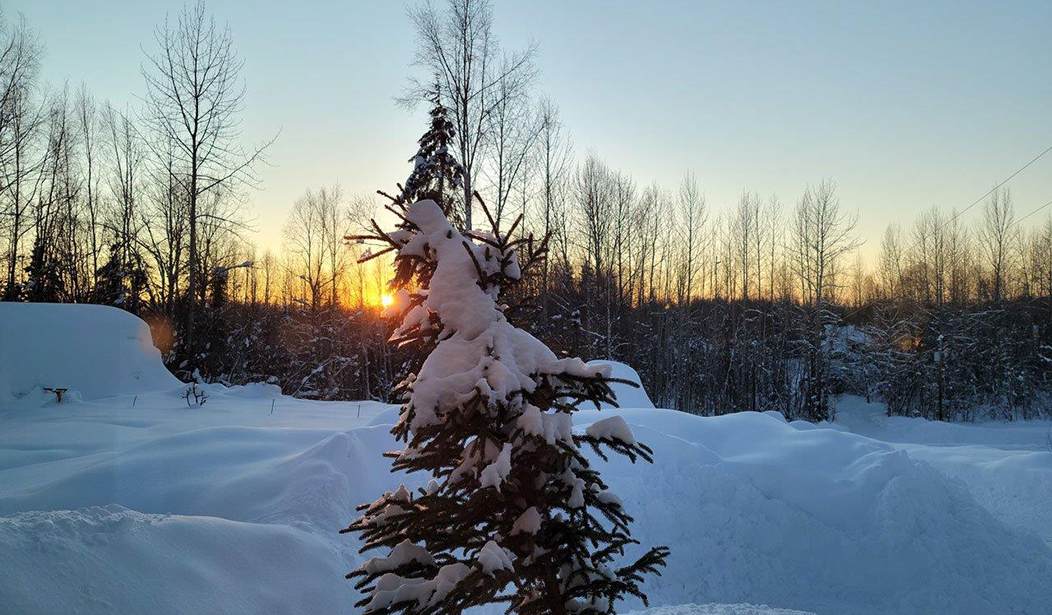Folks who live in the northern latitudes (and the southern, for that matter) get used to some oddities in daylight hours. Here in our Susitna Valley digs, we're quite a ways south of the Arctic Circle, but in June, at the summer solstice, sunrise is at 4:00 AM, and sunset is at 11:55 PM. Today (Friday), sunrise will be at 9:13 AM and sunset at 4:55 PM. At the winter solstice, we get not quite four hours of daylight.
It takes a bit of getting used to.
Plenty of Alaskans I know make the most of the long, dark winters. Personally, I get a lot of writing done. My wife, who runs a small publishing house, gets much of her editing and layout work done in winter. It's a good time of year to get indoor work done, whether it be money-making work or just arts and crafts stuff; and there are still the glorious sunny days where it's great to have a snow machine or a good pair of snowshoes.
But the long hours of darkness can get to some folks, and docs up here warn people about Seasonal Affective Disorder (SAD).
As the days grow darker earlier in northern latitudes, an affliction takes hold. Not just run-of-the-mill discontent over darker evenings, but the makings of an actual mental illness. Seasonal affective disorder, or SAD, is estimated to affect about 10 percent of people in northern latitudes. It’s often marked by low mood, a craving for carbohydrates, and fatigue that persists despite sleeping too much, lasting throughout an entire season. Women are estimated to be about three times more vulnerable than men. A whole industry has blossomed to treat it with light therapy, and it’s even made it into the courtroom.
But, despite affecting so many people, the very existence of SAD remains a point of contention.
People do have circadian rhythms, like all mammals — indeed, like all vertebrates. Personally, I'm inclined to think that we can control them to some extent rather than allow them to control us, and that may be why some researchers are skeptical about the whole concept of SAD.
In 2016, a controversial paper published in the journal Clinical Psychological Science stirred up a debate. Steven LoBello, a professor of psychology at Auburn University at Montgomery in Alabama, had needed a thesis idea for his graduate student, Megan Traffanstedt. The US Centers for Disease Control and Prevention regularly collects behavioral data by phoning members of the public, and LoBello had been working with the data sets, having done a massive collection of data using the PHQ-8 Depression Scale, a depression screening tool.
“I got to thinking: Well, you know, this would be really an unprecedented amount of data for documenting the seasonal effect on depression,” LoBello says. They set about analyzing the data. But when they measured depression levels against season, latitude, or sunlight exposure, they found no association. LoBello says they double-checked their methodology; they still couldn’t find why their results differed so heavily from others in the field.
Daylight savings time — as I've said before, an outdated concept that was stupid to begin with — can't help but screw up our circadian rhythms even more, of course.
Here's what I think the researchers here are missing, and this comes from my own early education in animal behavior, which is really just psychology for non-human animals; psychological issues can't be easily reduced to data. If the daylight hours bother some people, then they do, and you can't easily reduce that to data points.
Psychology or behavior, either one, isn't like physics, mathematics, or engineering; it's fuzzy, inexact, imprecise, and very, very subjective.
I can only speak from experience, but the long shifts in the day-night cycle here at our latitude don't bother us. My wife and I both adapt pretty well. But not everyone can; just as not everyone can get used to feet of snow and sub-zero temperatures. Every cat its own rat, as my grandfather used to say.
Not all mental oddities can be explained by wildly shifting daylight hours, though; certain states of more southern latitudes have their own... traditions.














Join the conversation as a VIP Member